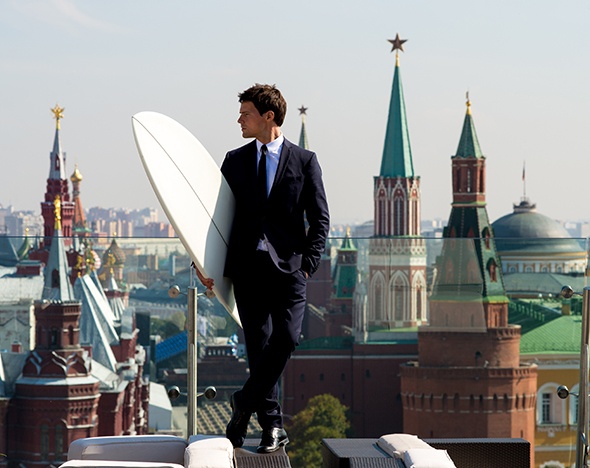I recall reading and loving Michael Idov’s “The Movie Set That Ate Itself,” his strange 2011 GQ journalistic walkabout in which he reported from the insane Ukraine film set of certifiable auteur Ilya Khrzhanovsky. Several unforeseen WTF professional and geopolitical moments later, he found himself one of Russia’s top screenwriters, crafting successful TV shows and films during the chill of the Second Cold War, perhaps an astute social commentator or maybe an unwitting government stooge.
Idov’s written a piece about his unexpected life changes for the New York Times Magazine, which is the first excellent longform article I’ve read this new year (sorry, Sean Penn). A passage about how the magazine editor began to branch out from the news biz to show biz, which offered greater freedom from the Kremlin’s intentionally fuzzy censorship rules:
Russia and the United States had exchanged the first salvos in the new cold war. Congress passed the Magnitsky Act, barring certain apparatchiks from entering the United States. In an asymmetric response, the Duma barred all Americans from adopting Russian children — a sudden jolt of direct discrimination, as my wife and I had been considering exactly that.
At work, too, not a week seemed to pass without a new law designed to curb free speech. Hastily adopted legislation basically made it illegal to offend any social group — though as wielded by the authorities, the new laws primarily seemed to protect the strong from the weak. Impugning the Soviet Union’s conduct in World War II was illegal. Disrespecting Russia’s ‘‘territorial integrity’’ was illegal. Mentioning drugs or suicide in a way that could be construed as ‘‘instructional’’ was illegal, and prosecutors could use an agency called Roskomnadzor to shut down any website for so much as an unruly user comment. A vile anti-gay law banned speech that ‘‘creates false equivalence between traditional and nontraditional lifestyle.’’ (This in a country whose pop stars’ wardrobes suggest that Russia’s biggest natural resource is rhinestones.) I had to fight Condé Nast’s in-house counsel for the right to publish a positive review of the Liberace biopic Behind the Candelabra; he objected to the use of the word ‘‘love’’ to describe a same-sex relationship.
The genius of all these laws was in their purposeful inconsistency, which ensured that almost anyone could be silenced at any time; they were designed to be implemented capriciously, to weed out undesirables. Editing a magazine became hazardous to your health — mental and otherwise. GQ’s political columnist, Andrew Ryvkin, was beaten up on the street by two pro-Putin writers of some renown, Sergei Minaev and Eduard Bagirov. I myself ended up slapping a Tatler editor on the steps of the Bolshoi Theater after he wrote anti-Semitic diatribes about me. This was shaping up to be the most surreal year of my life.
One night, I called Ryvkin with a spur-of-the-moment idea: ‘‘Let’s write Louie, but about me in Moscow.’’ Ryvkin had a similar background to mine (he spent his formative years in Boston) and similar comedic sensibilities; we both worshiped 30 Rock and Louis C.K. Three weeks, a few joints and several pizzas later, we had a pilot. The main character, a neurotic, blocked, broke Brooklyn novelist, comes to Moscow to promote his book, gets Jew-baited on live TV by a glib Russian oligarch and reconnects with his childhood friend Roman, now an out-of-control photographer modeled on Terry Richardson. The friends spend most of the episode crafting an appropriate response to the slur and finally head over to the oligarch’s club to beat him up. When they get there, however, the offender offers the novelist a plum job in Moscow, forcing him to sell out on the spot.The script was a mishmash of autobiography and anger, filled with profanity, drug use, gay jokes, Nazi jokes and weird structural hiccups. I was venting every frustration of my day job. In a good measure of how little I cared about the pilot’s suitability for Russian TV, I named its protagonist Matt Rushkin, ‘‘Rashka’’ being an émigré’s derogatory term for Russia itself.•

